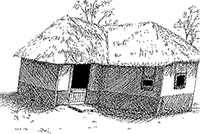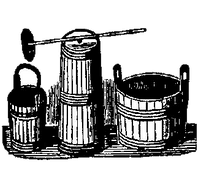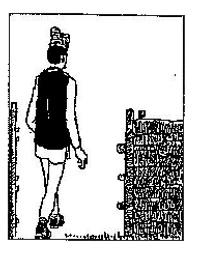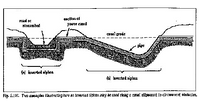- Appropriate Technology Microfiche Library
- Volunteers in Technical Assistance (VITA)
- Intermediate Technology's Technical Enquiry Unit
- FAKT Association for Appropriate Technology
- SIFAT (Servants in Faith And Technology/Southern Institute for Appropriate Technology)
- The Appropriate Technology Institute
- "Appropriate Technology" magazine from IT Publications
- An Appropriate Technology Newsletter
- Mennonite Hardware Store is Unique
- CECOCO "Guide Book for Rural Cottage and Small & Medium Scale Industries and Paddy Rice Cultivation"
- Information and Advice Available on Building in the Tropics
- Engineering Ministries International (EMI) Provides Free Help to Christian Ministries
- Book Review: Micro-Hydropower Sourcebook
- Hydronet
- Book Review: New Designs for Rural Electrification
- Book Review: Making Wheels: A Technical Manual on Wheel Manufacture
APPROPRIATE TECHNOLOGY MICROFICHE LIBRARY. This "library that fits in a shoebox" is one of the most comprehensive resources we have seen! The Library includes the complete text of 1000 of the best books (138,000 pages) on  village-level A.T. and sustainable development. It includes many out-of-print materials, classic field resources like Where There Is No Doctor and the VITA Village Technology Handbook, and extensive sections on agriculture, animal husbandry, health, construction, water systems, and small industries. At $895 it costs about 5% of a similar paper library. This would be a great resource on the field; perhaps you can ask your supporters to sponsor this as a project. The Library includes a copy of the Appropriate Technology Sourcebook, which gives a careful review of every book in the Library. You may order the Sourcebook separately for $23.95 paperback/$29.95 hardcover. (This 800-page annotated guide to appropriate technology literature includes reviews of 1150 of the best books on "village technology" from around the world. The purpose is not to give enough information to get to work, but books and plans are reviewed in sufficient detail to help you decide whether to purchase them. Ordering information is given for each book.) They plan to release this on CD-ROM in mid-1996. Three microfiche readers are also available, for $250 (office use), $375 (briefcase style), and $625 (prints from the screen). Contact the Appropriate Technology Institute, W110 Engineering Research Center, Colorado State University, Fort Collins, CO 80523, USA; phone 800/648-8043 or 970/491-7189; fax 970/491-2729.
village-level A.T. and sustainable development. It includes many out-of-print materials, classic field resources like Where There Is No Doctor and the VITA Village Technology Handbook, and extensive sections on agriculture, animal husbandry, health, construction, water systems, and small industries. At $895 it costs about 5% of a similar paper library. This would be a great resource on the field; perhaps you can ask your supporters to sponsor this as a project. The Library includes a copy of the Appropriate Technology Sourcebook, which gives a careful review of every book in the Library. You may order the Sourcebook separately for $23.95 paperback/$29.95 hardcover. (This 800-page annotated guide to appropriate technology literature includes reviews of 1150 of the best books on "village technology" from around the world. The purpose is not to give enough information to get to work, but books and plans are reviewed in sufficient detail to help you decide whether to purchase them. Ordering information is given for each book.) They plan to release this on CD-ROM in mid-1996. Three microfiche readers are also available, for $250 (office use), $375 (briefcase style), and $625 (prints from the screen). Contact the Appropriate Technology Institute, W110 Engineering Research Center, Colorado State University, Fort Collins, CO 80523, USA; phone 800/648-8043 or 970/491-7189; fax 970/491-2729.
VOLUNTEERS IN TECHNICAL ASSISTANCE (VITA) has an information service which provides technical help to people working in the developing world. Most of you have probably written to VITA from time to time with questions or requests for plans for appropriate technology items. Their publications on a wide variety of topics are clearly written and the plans are easy to follow. Ask them about their free services in support of development workers. For general information and technical service, write to 1600 Wilson Blvd., Suite 500, Arlington, VA 22209; phone 703/276-1800; fax 703/243-1865. Address publications orders and inquiries to P.O. Box 605, Herndon, VA 22070, USA.
INTERMEDIATE TECHNOLOGY'S TECHNICAL ENQUIRY UNIT can answer specific, detailed questions on a wide range of technical matters, offering information, referrals, and advisory services. They are an excellent contact if you are seeking some particular equipment. Direct your questions to Technical Enquiry Unit at ITDG, Myson House, Railway Terrace, Rugby CV21 3HT, UK; fax +44 -1788 540270; e-mail itdg@gn.apc.org. IT also has country offices in Sri Lanka, Zimbabwe, Bangladesh, Peru, Kenya, and Sudan.
FAKT ASSOCIATION FOR APPROPRIATE TECHNOLOGY can answer questions about technological problems. There is no charge for this service. FAKT consultants assist other organizations in finding socially and environmentally compatible solutions to challenges. They also identify and promote local consultancy structures in-country. FAKT can serve as a resource on the technologies of mini-hydropower, renewable energies, water supply and sanitation, food science/technology, and hospital technology. Their consultancy (with fees) includes planning technical projects, participatory project management, vocational training and craft promotion, evaluations and studies, and training programs and seminars. Contact FAKT Association for Appropriate Technology, Gansheidestr. 43, D-70184 Stuttgart, GERMANY; phone (0711) 21095-0; fax (0711) 21095-55.
SIFAT (Servants In Faith And Technology/Southern Institute For Appropriate Technology) offers practicums in appropriate technologies in Alabama and a few sites in South America. When people contact ECHO who want further training or information on technologies designed for developing countries, we often refer them to SIFAT. They have year-long internships, short courses, Learn & Serve teams, and cross-cultural seminars for short-term mission. Eight-week sessions include principles of community development, cross-cultural communication, and appropriate technologies for basic human needs (1996 cost: US$1200, or $150/week, including room, tuition, food, building materials, and books). Students learn water management, sustainable agriculture, alternate energy, and health and sanitation. Special hands-on projects are arranged depending on the interests of the student.
Write for a brochure. SIFAT will consider requests for financial aid to cover tuition, room, and board while at SIFAT, though these arrangements must always be made well before you leave home. In no case will they cover travel expenses. The government will not grant education visas to attend SIFAT because they are not a degree-granting institution, so citizens from other countries should apply for a tourist visa. They are located on a 180- acre farm approximately halfway between Atlanta, Georgia, and Birmingham, Alabama. Rt. 1 Box D-14, Lineville, AL 36266 USA; phone 205/396-2015; fax 205/396-2501.
THE APPROPRIATE TECHNOLOGY INSTITUTE: see information in Chapter 11 on Human Health.
APPROPRIATE TECHNOLOGY MAGAZINE FROM IT PUBLICATIONS is an excellent resource on a wide variety of AT topics. Each issue features some topic in depth and includes many case studies and practical ideas from around the world. This quarterly publication is œ15/$28 for private individuals via surface mail; airmail postage is L6/$12 additional. You may write for a free index, and many back issues are still available. Write IT Publications, 103-105 Southampton Row, London WC1B 4HH, UK.
AN APPROPRIATE TECHNOLOGY NEWSLETTER. Rus Alit (inventor of the Rus pump; see below) has started an Appropriate Technology Newsletter. We asked how to subscribe. "The receiver will be asked to subscribe after the first three issues. We will give free issues [Ed: write to Rus, not to ECHO] to those who are contributing articles. It will be a quarterly newsletter, costing US$10 per year. Each issue will focus on one particular innovation and will include case study, implications of change, technical details, reference to other AT innovations, and resources available in World Vision Australia department." Write Rus Alit, 7 Bonython St, Rochedale Queensland 4123, Brisbane, AUSTRALIA; phone/fax (07) 341-2371.
MENNONITE HARDWARE STORE IS UNIQUE. When we parked in front of Lehman's Hardware store in Kidron, Ohio, we  had to pick a spot between the horse-drawn carriages common in this Amish/Mennonite community. Reflecting the local tradition of continuing with older ways, Lehman's sells items I have not seen in any other store. There were several makes of wood-burning cookstoves, which I had not seen since I was a small child, complete with all kinds of accessories. I saw washboards, hand-powered washing machines, all types of wood working tools, kerosene, gas and gasoline lamps and accessories, sausage stuffers, bottle cappers, fruit peelers and pitters, large copper kettles, many kinds of cast iron cookware, hand-operated grain mills, many types of wood-heating stoves, a gas or kerosene refrigerator and a gas freezer, hydraulic rams and other hand pumps, cream separators, home pasteurizers, etc.
had to pick a spot between the horse-drawn carriages common in this Amish/Mennonite community. Reflecting the local tradition of continuing with older ways, Lehman's sells items I have not seen in any other store. There were several makes of wood-burning cookstoves, which I had not seen since I was a small child, complete with all kinds of accessories. I saw washboards, hand-powered washing machines, all types of wood working tools, kerosene, gas and gasoline lamps and accessories, sausage stuffers, bottle cappers, fruit peelers and pitters, large copper kettles, many kinds of cast iron cookware, hand-operated grain mills, many types of wood-heating stoves, a gas or kerosene refrigerator and a gas freezer, hydraulic rams and other hand pumps, cream separators, home pasteurizers, etc.
Mr. Lehman took a ten-year leave of absence to serve as a missionary with the Mennonite Central Committee in Zaire. "Soon after my return we decided to print a mail order catalog.... Partly in recognition of the loyal, volume buying of the larger missions and partly as our small contribution to the efforts of missionaries we developed special discounted prices on many of the items commonly used in the `bush'." They will send the $2 catalog free if you write on letterhead of your mission board. HOWEVER, if you want it sent airmail please send $3 for postage. If you are a missionary, it is IMPORTANT to also ask for the special missionary "non-electric" price list. To call for quotes or advice on replacement parts, phone 216/857-5757. Write to Lehman's, One Lehman Circle, P.O. Box 41, Kidron, OH 44636-0041, USA.
CECOCO "GUIDE BOOK FOR RURAL COTTAGE AND SMALL & MEDIUM SCALE INDUSTRIES AND PADDY RICE CULTIVATION" is a catalog of a great variety of agricultural, food processing, and small industry equipment (for making ropes, looms, paper bags and boxes, wire, bamboo products, and more). It is very unique with products that are difficult to find elsewhere. Send a description of the equipment you are looking for or ask for a list of products from CECOCO, P.O. Box 8, Ibaraki City, Osaka 567, JAPAN.
INFORMATION AND ADVICE AVAILABLE ON BUILDING IN THE TROPICS. When Dr. Reuben Sperling visited with us to discuss structural aspects of roof top gardens, he mentioned that he used to work with the overseas division of the Building Research Establishment in England. After seeing the practical literature they have published I am convinced that many of our  readers should know about this group. I quote from their literature:
readers should know about this group. I quote from their literature:
"One of the Division's most important publications is the series of Overseas Building Notes, distributed to readers in over 80 countries. The Notes are published approximately six times a year and recent titles have included 'Preservation of timber for tropical buildings', Stabilized soil blocks for building', Roofs in hot dry climates' and 'The management of resources on construction sites.'" Many papers are written by experts from third world institutions. "Several hundred inquiries are answered each year. Similarly many research workers, builders, architects, housing managers and students from all over the world visit the Division each year ... [to discuss] building research or building techniques in use elsewhere."
I have copies of some of their publications. Although this is far removed from my expertise, they seem to be very practical and understandable. You can obtain copies for a small charge (or perhaps free if you explain what you are doing). Here are some selected titles: Small buildings in earthquake areas; Termites and tropical building; Brickmaking in developing countries; Health aspects of latrine construction; Timber in tropical building; Bitumen coverings for flat roofs; Low cost housing in urban and peri-urban areas; Rice husk ash cement; Building for comfort; and Disease reduction by improved house construction. Address your requests to BRE Bookshop, Building Research Establishment, Garston, Watford, WD2 7JR, UK.
ENGINEERING MINISTRIES INTERNATIONAL (EMI) PROVIDES FREE HELP TO CHRISTIAN MINISTRIES. Engineering Ministries International (EMI) is a group of evangelical professional architects and engineers who volunteer their services "to proclaim the love of Jesus Christ through the work of Christian relief projects." They have experience in such fields as structural engineering, architectural planning, hydraulics (including hydrogeology and water supply), electrical and mechanical engineering, and surveying. EMI's Director, Michael Orsillo, has years of education and experience in civil engineering, and he is also an ordained minister.
Many mission buildings and churches are built with little or no professional design work. EMI is able to provide competent design assistance at a fraction of the cost of professional consulting services. Often the cost of assistance is off-set by a savings in material costs, time over-runs or future maintenance problems. They are presently working with plans for an orphanage in Honduras, a low-budget church in India, a water system for an Ethiopian women's hospital, and a youth camp in Indonesia.
In order to be eligible for this technical assistance from EMI, projects must minister to the needs of the poor, directly proclaim the gospel of Christ, and have realistic possibilities for funding the building of the project once the design is completed. EMI's design services are provided free of charge. They do not fund the cost of construction. For more information, contact Mr. Michael Orsillo, Engineering Ministries International, 110 S. Weber, Suite 104, Colorado Springs, CO 80903, USA; phone 719/633-2078; fax 719/633-2970.
MICRO-HYDROPOWER SOURCEBOOK. This book deals with a topic beyond my expertise. However, I can tell that it would be "must reading" if I were trying to decide whether to begin a project to harness waterpower, and even more so if I decided to go ahead with the project! ("Micro-hydropower" refers to plants that generate less than 100 kilowatts of electricity.)
This 285-page book is exceptionally well-illustrated with 200 photos of case examples of facilities in the third world and about  as many drawings. It has a variety of designs, approaches and case studies. It provides the theory as well as practical guidelines required to plan, design, and implement micro-hydropower schemes. Chapter topics include measuring head and discharge, streamflow, site selection and layout, construction of the facility, turbines, electrical vs. mechanical power, governing, electrical aspects, and case studies.
as many drawings. It has a variety of designs, approaches and case studies. It provides the theory as well as practical guidelines required to plan, design, and implement micro-hydropower schemes. Chapter topics include measuring head and discharge, streamflow, site selection and layout, construction of the facility, turbines, electrical vs. mechanical power, governing, electrical aspects, and case studies.
I wrote the author, Allen Inversin, asking whether most of our readers would not find electrical generation more technical than they could handle. He replied, "I should note that the Sourcebook focuses not only on electricity generation, but possibly more importantly on the generation of mechanical power to directly drive agro-processing equipment. As it turns out, the most successful microhydropower projects are those which provide mechanical power to mill grain, hull rice and expel oil from oil seed. The success of such programs in Nepal is due wholly to the fact that the focus ... is on productive, income-generating end uses. ...the generation of electricity is a secondary benefit, which is generally realized only after the plants have already generated the income to cover their costs."
The sourcebook is still available as of February 1999. The cost is $22 plus shipping. Individuals working in a volunteer capacity overseas qualify for a special price of $18 plus shipping. Shipping costs $6 for surface mail. For airmail add $10 in Latin America, $15 in Europe and Africa and $20 in Asia. Order from NRECA International Foundation; Attn: Sourcebook; 4301 Wilson Blvd., Arlington, VA 22203-1869; Phone: 703-907-5637; e-mail 74720.551@compuserve.com.
In response to this review in EDN, John and Caryl Busman wrote of their experience in Tamil Nadu State in southern India. "Although power was provided erratically and at widely varying voltages, farmers did everything possible to connect their irrigation pumps to the 'grid.' Attractive electrical rates and low maintenance costs compared to bullocks or diesel made the decision to switch an easy one. That one state ended up with a million electric pumps on small irrigation wells.
"The question is, Who fixes things when they break? The informal sharing of knowledge has created a whole new group of technicians. Little villages would have 4-5 people who knew the business of rewinding motors. You would see motors hauled to town on ox carts for service, with quick turn around time for repair. What is most interesting is that this has all happened within 20 years."
HYDRONET is an international newsletter for the dissemination of information on micro-hydro power techniques and experiences. It is published in English, Spanish, and Indonesian three times a year. Contact Intermediate Technology, 15B Alfred Place, Colombo 3, SRI LANKA; phone 577455/6/7; fax 577458; e-mail itsrilan@sri.lanka.net.
NEW DESIGNS FOR RURAL ELECTRIFICATION (80 pp.) describes the technical and organizational innovations which enabled a power company in Nepal to reduce costs and maximize benefits of supplying electricity to rural subsistence communities. Topics such as the cost of grid extension, utility poles which can be easily carried to remote areas, housewiring alternatives, low-wattage electric cookers, users' organizations to coordinate the villagers and the electric utility company, and community motivators are included. Many pictures are included. Cost is $20 including airmail postage. Order from NRECA International Foundation, Attn: New Designs for RE, 1800 Massachusetts Avenue, N.W., Washington, D.C. 20036-1883, USA; phone 202/857-9622; e-mail 74720.551@compuserve.com.
MAKING WHEELS: A TECHNICAL MANUAL ON WHEEL MANUFACTURE (153 pp.) is a well-illustrated and detailed book on this low-cost technology based on a hand-operated bending device. Rims can be made for bicycles, carts, and cars. An assembly jig ensures that wheels are constructed to a consistent high quality. Readers should have good metal-working skills. Available for $28.95 plus postage from Women, Ink., 777 UN Plaza, New York, NY 10017, USA; phone 212/687-8633; fax 212/661-2704; or œ14.95 from Intermediate Technology Publications, 103/105 Southampton Row, London WC1B 4HH, UK; fax 44 171 436 2013; e-mail itpubs@gn.apc.org. Ask for their catalog and a list of distributors in developing countries.